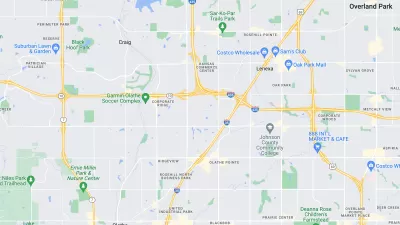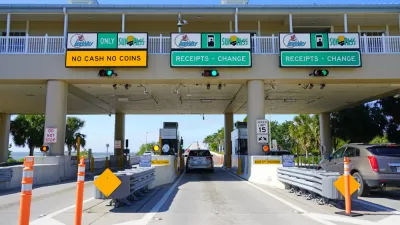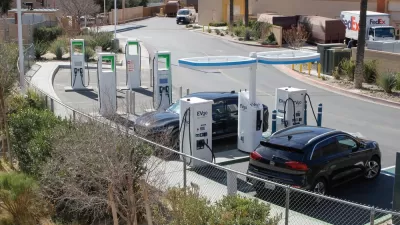The Dallas Morning News investigated over promising and under delivering by regional mobility authorities in Texas.
James Drew launches the story by citing some example of how little local transportation agencies have to show for millions of dollars spent in planning:
- A plan in Grayson County to extend the Dallas North Tollway to Oklahoma. "The result six years later: at least $2.2 million in state funds spent, but no toll road."
- A 2004 proposal in Tyler "to build a $248 million outer loop to absorb traffic and rake in tolls from a county of about 220,000 people." But only half the beltway has been completed, even after "the state wrote off a $55 million loan that was supposed to be repaid with toll dollars."
- A proposal in San Antonio to "build 50 miles of toll lanes stretching across the traffic-choked north side of Bexar County" has produced zero miles of road and also led to an overhaul of the local transportation agency.
Drew traces the trend to authority of regional mobility authorities (RMAs) with the power "to use bonds build transportation projects and pay them off with tolls." The agencies do not, however, have the power to levy taxes. "The theory is that the tolls stay home, boosting area economies," according to Drew's explanation of the scheme.
But here's the rub, to sum:
"But nearly 15 years after the Texas Legislature changed state law so the agencies could be created, most of the nine RMAs have struggled to live up to their ambitions while burning through about $1 billion in tax dollars, an investigation by The Dallas Morning News has found."
The article goes on to provide a great deal more in-depth discussion of the promise and disappointment of RMAs—not only in theory but by taking a close look at case studies provided by examples like those summarized above.
FULL STORY: Roads to nowhere

Planetizen Federal Action Tracker
A weekly monitor of how Trump’s orders and actions are impacting planners and planning in America.

Maui's Vacation Rental Debate Turns Ugly
Verbal attacks, misinformation campaigns and fistfights plague a high-stakes debate to convert thousands of vacation rentals into long-term housing.

San Francisco Suspends Traffic Calming Amidst Record Deaths
Citing “a challenging fiscal landscape,” the city will cease the program on the heels of 42 traffic deaths, including 24 pedestrians.

Defunct Pittsburgh Power Plant to Become Residential Tower
A decommissioned steam heat plant will be redeveloped into almost 100 affordable housing units.

Trump Prompts Restructuring of Transportation Research Board in “Unprecedented Overreach”
The TRB has eliminated more than half of its committees including those focused on climate, equity, and cities.

Amtrak Rolls Out New Orleans to Alabama “Mardi Gras” Train
The new service will operate morning and evening departures between Mobile and New Orleans.
Urban Design for Planners 1: Software Tools
This six-course series explores essential urban design concepts using open source software and equips planners with the tools they need to participate fully in the urban design process.
Planning for Universal Design
Learn the tools for implementing Universal Design in planning regulations.
Heyer Gruel & Associates PA
JM Goldson LLC
Custer County Colorado
City of Camden Redevelopment Agency
City of Astoria
Transportation Research & Education Center (TREC) at Portland State University
Jefferson Parish Government
Camden Redevelopment Agency
City of Claremont





























